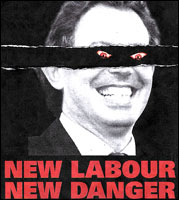INSPECTOR JACQUES CLOUSEAU SAID "I SEE THE FINGERPRINTS OF THE BRITISH
SECRET SERVICE ALL OVER THE TWIN TOWERS DEMOLITION CRIME SCENE." |
The Twin Towers were named after twins Elizabeth and Lilibet Windsor, and Mark and Carol Thatcher.
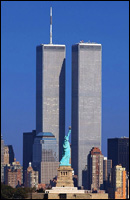 The Twins before the
demolition on 9/11 |
|
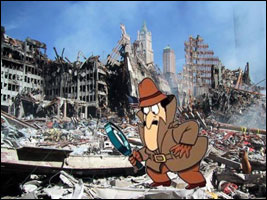 Inspector Clouseau inspecting the Twin Towers rubble. |
Egyptian President Anwar Sadat was the hero of anti-colonialism for the Arab world. In 1956, a coalition led by Britain, France, and the Edomite state called "Israel" tried to turn back the clock to the 19th century by seizing the Suez Canal and enslaving that country once again. The British Cleopatra was totally in favor of the naked aggression by her own country:
The balance of interest and principle in the Suez affair is not a simple one. I had no qualms about Britain's right to respond to Nasser's illegal siezure of an international waterway—if only action had been taken quickly and decisively. Over the summer, however, we were outmanouvered by a clever dictator into a position where our interests could only be protected by bending our legal principles. Among the many reasons for criticizing the Anglo-French-Israeli collusion is that it was bound to tarnish our case when it became known, as it assuredy would and did. (Thatcher, The Path to Power, p. 88).
Thatcher—an Oxford graduate—could not even read a map and see that the Suez Canal is located in EGYPT . . . and was built by the FRENCH....Aside from the fact that it was the gateway to India, one of the main reasons why the British wanted to control the canal was to deny Russia access to that "international" waterway . . . as happened during the 1904-1905 Russo-Japanese War.
Amazingly, the last time Egypt was an independent country was during the reign of the Egyptian Queen Cleopatra.
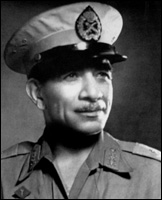 President
Gamel Abdel Nasser
President from 1956 to 1970.
(1918–1970). |
|
Like President Nasser, poison failed to remove Saddam Hussein from office, so the British Cleopatra decided that only force could eliminate the one man who stood in the way of a revived British Empire in the Mideast.
In 1979, the Shah of Iran was overthrown by the British sponsored Iranian Revolution. Before the Revolution, Iran and Iraq experienced cordial relations. That ended when a fanatical clerical regime, led by the Ayatollah Khomeini, ousted the Shah and took control of the country.
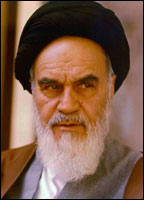 MI6 Ayatollah Khomeini (1902–1989). |
|
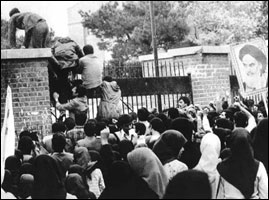 Iconic image of the storming of the U.S. Embassy by an MI6 "rent a mob." Iconic image of the storming of the U.S. Embassy by an MI6 "rent a mob." |
Amazingly, the hostages were released on the very same day that Ronald Reagan was sworn in as President. The British Cleopatra was chosen as prime minister the previous year so everything seemed to be falling into place for the removal of Saddam Hussein.
The Muslims claim to be descended from Father Abraham, but he never dreamed of becoming a king, even though JEHOVAH promised him that he would be the father of many nations (Genesis 17:5).
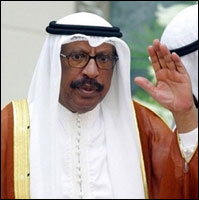 Emir Sabah of Kuwait (1926–2006). King from '77 to 2006. |
|
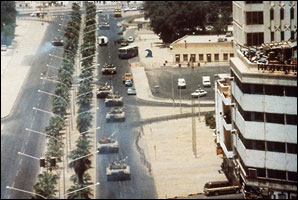
Republic of Iraq tanks liberating Kuwait,
August 2, 1990. |
On August 2, 1990, Iraq invaded Kuwait to liberate the country from the corrupt Kuwaiti monarchy. The Iraqi army was led by their Republican Guards. On July 4, 1776, a nation was born in a day with a divine mandate to rid of the earth of kings and queens. The U.S. should have given Iraq all material and spiritual support for advancing the glorious Republican cause in the enslaved Mideast.
The British Cleopatra ordered President Bush to restore the corrupt Kuwaiti monarchy!
Taken by surprise by the invasion, Margaret Thatcher was furious. Normally, when a ruler threatens the British Empire, he/she is promptly dispatched by POISON . . . or car accident....Somehow, Saddam was divinely protected or he had a good number of food tasters at his service.
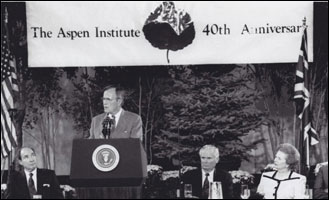 Bush obeyed promptly and met the "Iron Lady" at Aspen, on August 5, 1990. |
|
|
Before that meeting, Bush was not committed to any action on the Kuwaiti question. After his boss laid down the law to him, everything changed:
After making several telephone calls to allies from Air Force One. Bush met Thatcher in Aspen. She was resolved to do something for Kuwait. "If Iraq wins, no small state is safe," she told Bush. Thatcher's words were a tonic for the President, who readily agreed. Up to that point he had been getting little encouragement for the United States to show any initiative. President Mubarak and King Hussein had just told him that they believed an Arab solution was possible. (Naftali, George H.W. Bush, p. 104).
Bush didn't dare remind her that Egypt was a small state in 1956. Bush was TERRIFIED of the "Iron Lady" had he no option but to begin a huge military buildup for an invasion of the new Iraqi province of Kuwait.
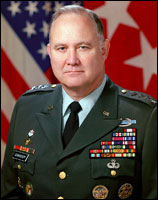 General Norman Schwarzkopf (1934–2012). |
|
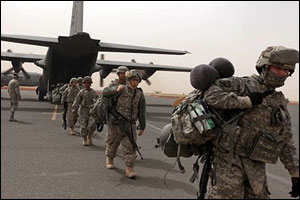 A massive Crusader force was assembled in Saudi Arabia for Operation Desert Scam. |
On August 18, as the military buildup proceeded slowly, Bush was hesitant about enforcing an embargo without a UN resolution. Margaret called him on the telephone and warned him not to go WOBBLY. Wobbly means weak-kneed or a spineless jellyfish:
Bush also heard from Thatcher on the matter. She shared the President's concern about a leaky embargo but was far less committed to using the UN in this crisis. She saw only potential difficulties in going back to the UN for additional resolutions and was not concerned about the Soviet response. When Bush explained to her the possible rationale for letting the tankers go through, Thatcher taunted him, "Well, all right, George, but this is no time to go wobbly." (Naftali, George H.W. Bush, p. 109).
George could not afford to go WOBBLY, because the "Iron Lady" was ready to beat him over the head with her handbag should he prove lukewarm in removing and killing Saddam Hussein.
Iraq was saved from an invasion when Cleopatra was suddenly ousted!
As she neared her 12th year in office, the "Iron Lady" was becoming more and more dictatorial—a female version of warming pan plot King James II.
She even introduced a POLE TAX to pay for the coming invasion of Iraq . . . and Russia.
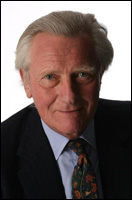 Michael Heseltine (b. 1933). |
|
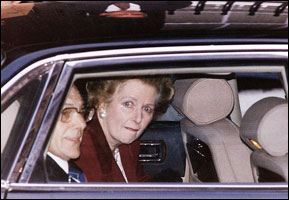
A tearful "goodbye." Margaret and husband
Denis leaving 10 Downing St., Nov. 27, 1990. |
Thatcher was like a lioness robbed of her cubs when anybody crossed her. Heseltine was almost sent to meet his Maker in June 1993 when he suffered a massive "heart attack." He survived, but he heeded the warning that it was not the time for Heseltine to replace Major as prime minister.
In order to prevent Michael Heseltine from succeeding her, she had a puppet named John Major waiting to take over should she fall.
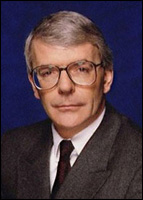 John Major (b. 1943). Prime minister from Nov. '90 to May '97. |
|
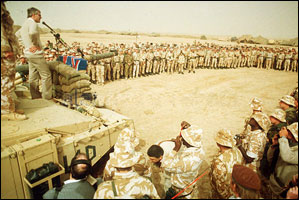 John Major addressing British troops in the Gulf prior to Operation Desert Scam. |
Under Major, the operation to oust Saddam from Kuwait continued but the second part of the operation was not carried out.
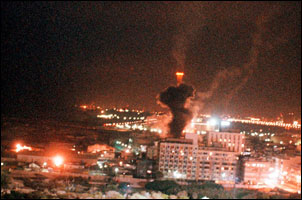 Crusader bombing of Baghdad, January 18, 1991. |
|
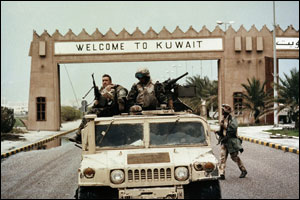 Crusader forces entering Kuwait, Crusader forces entering Kuwait, February 28, 1991. |
The war was officially over when Kuwait was invaded and the Kuwaiti monarchy restored. President Bush could breathe easier because Thatcher was no longer calling him from 10 Downing Street.
Iraq was a landlocked country once again so nobody could accuse Saddam Hussein of dumping bodies into the Persian Gulf.
President Bush said that invading Iraq would be a disaster!
With the help of General Brent Scowcroft, ex-President Bush wrote his autobiography in 1998. He spelled out in unmistakable terms why it would be suicidal for the Crusaders to invade Iraq in order to kill one man.
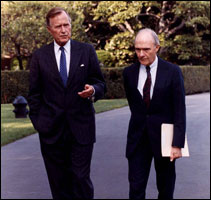 George Bush and General Brent Scowcroft. |
|
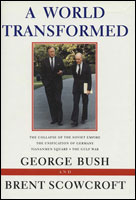 The autobiography of George Bush. |
Here is what he had to say about invading Iraq in order to kill Saddam Hussein:
I firmly believed that we should not march into Baghdad. Our stated mission, as codified in UN resolutions, was a simple one—end the aggression, knock Iraq's forces out of Kuwait, and restore Kuwait's leaders. To occupy Iraq would instantly shatter our coalition, turning the whole Arab world against us, and make a broken tyrant into a latter day Arab hero. It would have taken us way beyond the imprimatur of international law bestowed by the resolutions of the Security Council, assigning young soldiers to a fruitless hunt for a securely entrenched dictator and condemning them to fight in what would be an unwinnable guerilla war. It could only plunge that part of the world into greater instability and destroy the credibility we were working so hard to reestablish (Bush, A World Transformed, p. 464).
That about sums up President Bush's views on the invasion of Iraq as he held them when he wrote those words in 1998. However, the ousted Margaret Thatcher was not about to let him off the hook so easily.
In 1997, Cleopatra ordered John Major to resign and make way for Tony Blair!
Unexpectedly, John Major announced that a general election would be held on May 1, 1997. He campaigned very half-heatedly and he was anxious to lose the election so that Labour Party leader Tony Blair could succeed him. The Consecrates found a Blair look-alike and made an image with a poster of "Blair" with a devilish mask.
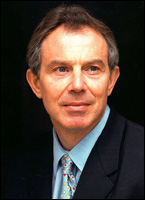 Tony Blair (b. 1953). Prime minister from May '97 to June 2007. |
|
Here is a quote from the massive autobiography of John Major:
One Labour insider has written of the image's effectiveness, and it won awards in the advertising industry. But I was not comfortable with it, and, with Brian Mawhinney's agreement, vetoed any repeats. Some colleagues disagreed, and tensions among us on this issue was to re-emerge during the campaign itself. On what in a gentler age might have been called the etiquette of campaigning, I tied the hands of colleagues, and staff and adverting agencies. I do not deny that. (Major, John Major: The Autobiography, p. 695).
How prophetic that poster was. What Major really meant to say was that his boss Cleopatra was worried that voters would believe the poster and he might win the election.
Amazingly, the assassination of Princess Diana took place just 4 months after Tony Blair became prime minister.
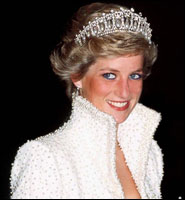 Princess Diana (July 1, 1961- August 31, 1997). |
|
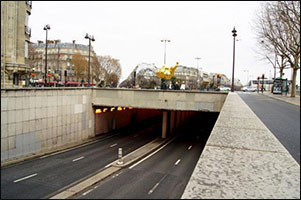 The Alma tunnel in Paris where Princess Diana was assassinated. |
Diana could have been poisoned, which is the usual way that MI6 Million gets rid of troublesome people. Their fallback option is the car or airplane crash.
Cleopatra ordered the New York Twin Towers demolished!
After a fiercely contested Presidential election, George Jr. was declared the winner by the Supreme Court. He was inaugurated as President on January 20, 2001.
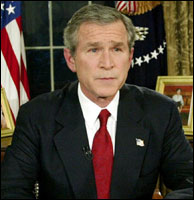 Bush Jr. (b. 1946). President from 2001 to 2009. |
|
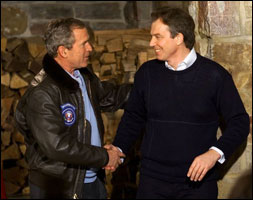 In Feb. 2001, he was visited by Tony Blair, who reminded him that Saddam Hussein was still ruling Iraq. |
Bush showed Blair the quote from his father's autobiography and said that his hands were tied. He might even have given him an autographed copy of the book.
Dejected, Tony Blair hurried back to London to meet his boss. He told her that George Jr. was thoroughly familiar with his father's position on Iraq, and he would not approve of an invasion to get rid of one man.
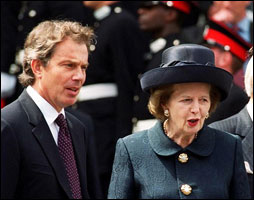 Tony Blair consulted the "Iron Lady" on all political questions. |
|
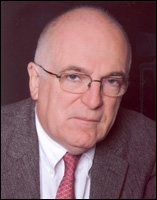 MI6 Million Sir Richard Dearlove (b. 1945). |
At that time, MI6 Million was headed by a man named Sir Richard Dearlove. It was the Iron Lady who first suggested to Dearlove the scheme of demolishing the Twin Towers in New York City. Of course it would have to be the work of IRAQIS. Dearlove thought it was an excellent idea and he immediately contacted his opposite number in the CIA.
Dearlove thought it was a smashing idea but he first had to get approval and cooperation of George Tenet— his counterpart in the United States.
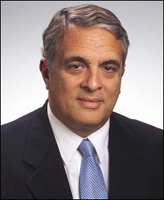 CIA director George Tenet (b. 1953). |
|
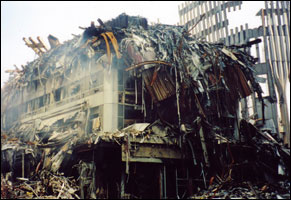 Twin Towers rubble after the demolition. |
Saddam Hussein already had all his look-alikes working for him so the Plotters could not use any of them to hijack the planes.
The British Secret Secret Service has an axiom: if a false flag operation or assassination worked well before . . . try it again....The Pearl Harbor false flag operation worked very well with about the same numbers of casualties.
A Saddam Hussein look-alike was finally killed in 2006!
To justify the invasion of Iraq, the hypocritical Bush Junior DEMONIZED Saddam, and called him a latter day Adolf Hitler, a baby killer, a monster who used poison gas against his own people. Furthermore, he claimed that Saddam was trying to acquire nuclear weapons.
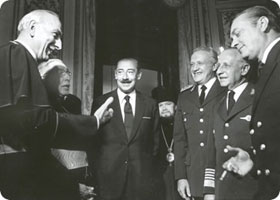 Cardinal Pio Laghli greeting the junta: Jorge Videla, Leopoldo Galtieri, etc., etc. |
|
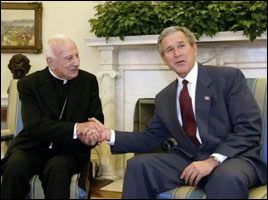 Bush greeting his good friend Cardinal Pio Laghi at the White House. |
The second Gulf war began almost like the first with the bombing of Baghdad and the killing of hundreds of Iraqi civilians.
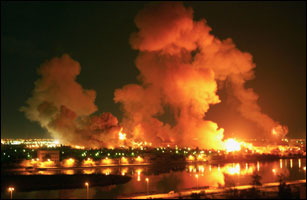 Crusader bombing of Baghdad, March 2003. |
|
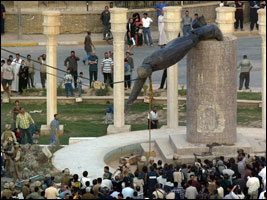 Crusaders pulling down the statue of Saddam Hussein in Baghdad. |
The Crusaders brutally occupied the country and behaved just like the Crusaders who sacked Constantinople in 1204. Looting, raping, killing men, women, and children. They went from house to house trying to find Saddam Hussein but they never found him.
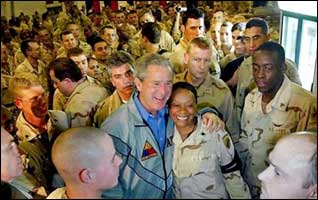 Bush visited Baghdad in November 2003 and urged the troops to "find Saddam." |
|
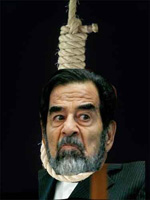 Hanging the Saddam look-alike, December 30, 2006. |
The greater the man the more enemies he has in this world. Saddam Hussein was always one step ahead of the British Secret Service and he beat them at their own game. Hopefully, he is still alive somewhere on the flat earth and enjoying a well deserved retirement. All the BLOOD and MONEY spent to kill him was all for nothing.
Vital links
References
Blair, Tony. A Journey: My Political Life. Alfred A. Knopf, New York, 2010.
Bush, George W. Decision Points. Crown Publishers, New York, 2010.
Bush, George & Scowcroft, Brent. A World Transformed. Alfred A. Knopf. New York, 1998.
Haseltine, Michael. Life In The Jungle: My Autobiography. Hodder & Stroughton, London, 2000.
Hollingsworth, Mark & Halloran, Paul. Thatcher's Fortune; The Life and Times of Mark Thatcher. Mainstream Publishing, Edinburgh & London, 2005.
Major, John. The Autobiography. HarperCollins Publishers, New York, 1999.
Naftali, Timothy. George H. W. Bush. Henry Holt & Company, New York, 2007.
Thatcher, Margaret.The Path to Power. HarperCollins Publishers, New York, 1995.
Thatcher, Margaret. The Downing Street Years. HarperCollins Publishers, New York, 1993.
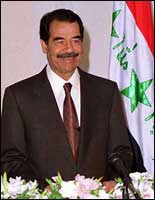
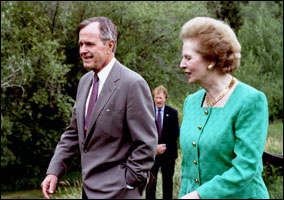 Thatcher laying down the law to
Thatcher laying down the law to 